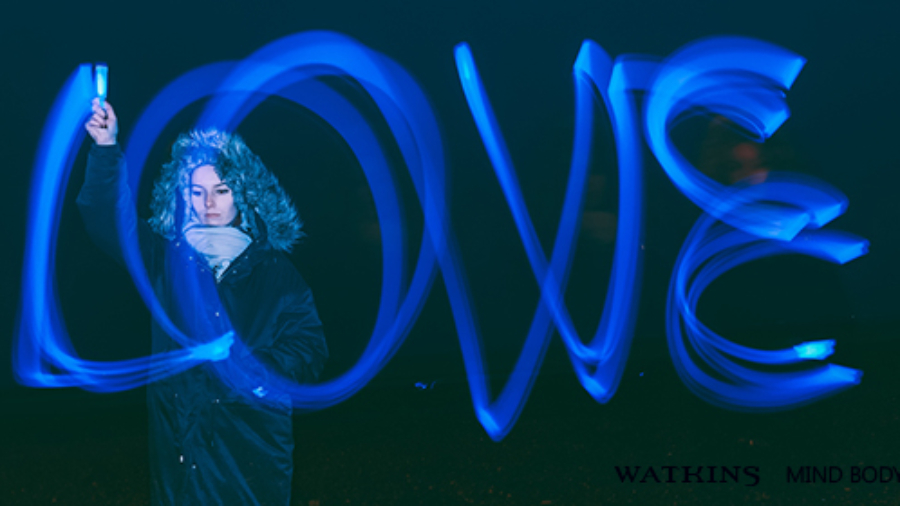World-renowned teacher and author Sharon Salzberg encourages us to strip away negative habits and preconceptions to help us experience authentic love based on direct experience.
This article first appeared in Watkins Mind Body Spirit, issue 52.
Since we were children, we have been told a patchwork of stories about love. We expect love to give us exaltation, bliss, affection, fire, sweetness, tenderness, comfort, security, and so very much more—all at once.
Our minds are too often clouded by pop-culture images that equate love with sex and romance, delivered in thunderbolts and moonbeams. This idea of love makes us say things and do things we do not mean. It makes us cling frantically to relationships that are bound to change, challenge us, or slip away. Major bookstores often have a love section that’s actually just a romantic relationship section—volumes on how to get a relationship, how to keep a relationship, and how to cure a relationship. As one publisher said to me, “The love market is saturated.”
Perhaps we think we’re getting the portion of love we deserve, which is not very much at all: “I’m just not lucky in love,” or “I’ve been too damaged to love.” We may feel so cynical (sometimes as a mask to hide heartbreak or loneliness) that we dismiss love as a sorry illusion. Some of us decide we are through with love because it takes much more from us than it ever gives back. At those wounded moments when we most need love, a hardened heart can seem like the best defense.
Many of us have been told that if we loved others enough and sacrificed, it wouldn’t matter that we didn’t love ourselves, and that we could keep that up forever. Or if we loved a friend or a child enough, that love itself could cure all ills, meaning no more painful setbacks or defeats. If there is such pain, it implies we were bad at love. Or maybe it was suggested to us that all we needed in this world was love and that we didn’t have to fight what is wrong or call out what is cruel or unjust.
But apart from all these stories, as human beings we naturally live our lives wanting belonging, connection, a home in this world. We yearn for warmth, for possibility, for the more abundant life that love seems to promise. We sense there is a quality of real love that is possible beyond the narrow straits we have been told to navigate, a possibility that’s not idealised or merely abstract. We have an intuition that we can connect so much more deeply to ourselves and to one another.
One of my own turning points came in 1985 when I did a meditation retreat in Burma. I was practicing intensive lovingkindness meditation, offering phrases of wishing well to myself and others all day long, like, “May I be happy; may you be happy.” As I practiced, at one point it felt as though I came to a threshold. On one side was the conventional idea of who I had thought myself to be— that is, someone completely dependent on another person to feel any love in my life. It was as though I considered love to be like a package, in the hands of the all- powerful delivery person, and if that person changed their mind at my doorstep and walked away, I would be bereft— irredeemably incomplete, lacking the love I so longed for. On the other side of the threshold was the reflection of who I suspected I actually was— someone with an inner capacity for love, no matter who was present or what was happening, someone who could access love that another person might enhance or challenge, but there was no one who could either bestow that capacity on me or take it away. I stepped over.
I saw I couldn’t flourish as a human being as long as I saw myself as the passive recipient of love. (There’s an awful lot of waiting in that position, and then damage control when it doesn’t work out, and also numbness.) But I could certainly flourish as love’s embodiment.
Real Love: The Art of Mindful Connection is an exploration of real love—the innate capacity we each have to love—in everyday life. I see real love as the most fundamental of our innate capacities, never destroyed no matter what we might have gone through or might yet go through. It may be buried, obscured from view, hard to find, and hard to trust… but it is there. Faintly pulsing, like a heartbeat, beneath the words we use to greet one another, as we ponder how to critique others’ work without hurting them, as we gather the courage to stand up for ourselves or realise we have to let go of a relationship—real love seeks to find authentic life, to uncurl and blossom.
I believe that there is only one kind of love—real love—trying to come alive in us despite our limiting assumptions, the distortions of our culture, and the habits of fear, self-condemnation, and isolation that we tend to acquire just by living a life. All of us have the capacity to experience real love. When we see love from this expanded perspective, we can find it in the smallest moments of connection: with a clerk in the grocery store, a child, a pet, a walk in the woods. We can find it within ourselves.
Real love comes with a powerful recognition that we are fully alive and whole, despite our wounds or our fears or our loneliness. It is a state where we allow ourselves to be seen clearly by ourselves and by others, and in turn, we offer clear seeing to the world around us. It is a love that heals.
The how of Real Love is based on a tool kit of mindfulness techniques and other practices cultivating lovingkindness and compassion that I have been teaching for over forty years. Mindfulness practice helps create space between our actual experiences and the reflexive stories we tend to tell about them (e.g., “This is all I deserve”). Lovingkindness practice helps us move out of the terrain of our default narratives if they tend to be based on fear or disconnection. We become authors of brand-new stories about love.
There are meditations, reflections, and interactive exercises designed to be suitable for anybody. They outline a path of exploration that is exciting, creative, and even playful. I draw from my own experience and from that of the many meditation students I have guided, several of whom have generously offered their stories. The meditations in particular are meant to be done more than just once— over time, practicing them will create a steady foundation in mindfulness and lovingkindness in our lives.
Our exploration begins with that often-forgotten recipient who is missing real love: ourselves. We expand the exploration to include working with lovers, parents, spouses, children, best friends, and work friends, divorce, dying, forgiveness—the challenges and opportunities of daily life. And we move on to exploring the possibility of abiding in a sense of profound connection to all beings, even those around whom we draw strong boundaries or have tried in the past to block. We may not at all like them, but we can wish them to be free (and us to be free of their actions defining us). This vast sense of interconnection, within and without, leads us to love life itself.
I have written this book for all who find that yearning within to be happier, who dare to imagine they might be capable of much, much more in the matter of love. And I have written it for those who at times suffer in feeling unloved and incapable of changing their fate. My hope is that through this book I can help you cultivate real love, that beautiful space of caring where you come into harmony with all of your life.
Meet the author: Sharon Salzberg is a central figure in the field of meditation, a world-renowned teacher and bestselling author. She has played a crucial role in bringing meditation and mindfulness practices to the West and into mainstream culture since 1974, when she first began teaching. She is the co-founder of the Insight Meditation Society in Barre, MA and the author of ten books including New York Times bestseller Real Happiness and her seminal work Lovingkindness. She is a regular columnist for On Being, a contributor to Huffington Post, and the host of her own podcast: The Metta Hour. come into harmony with all of your life.

 Cart is empty
Cart is empty 
